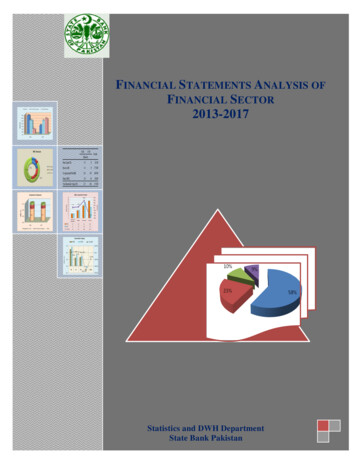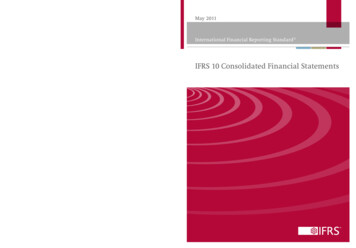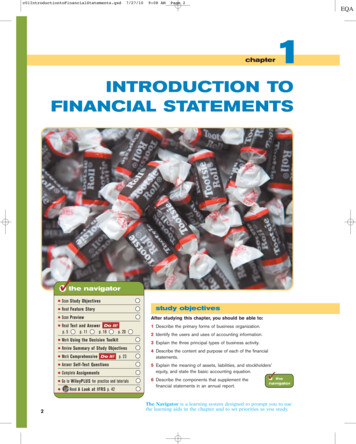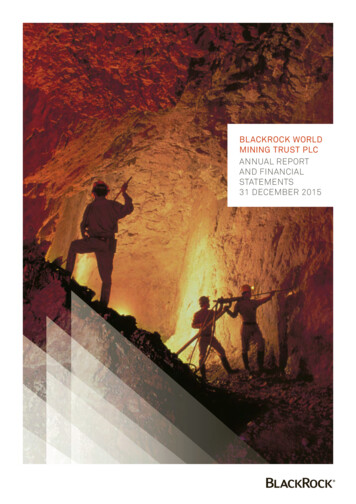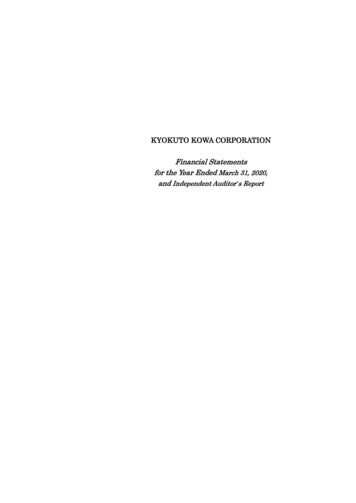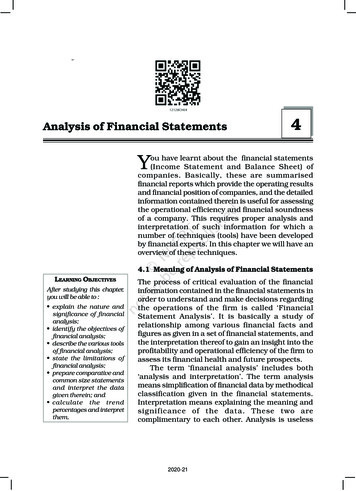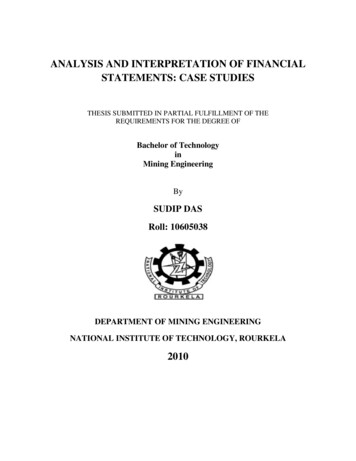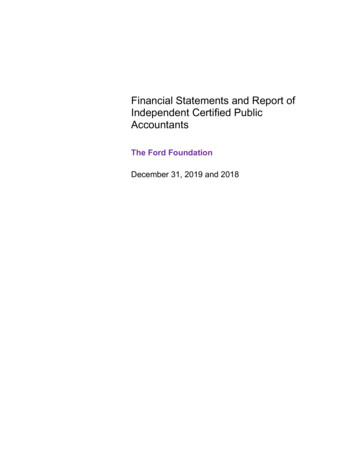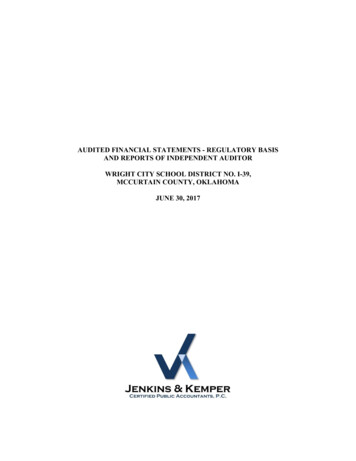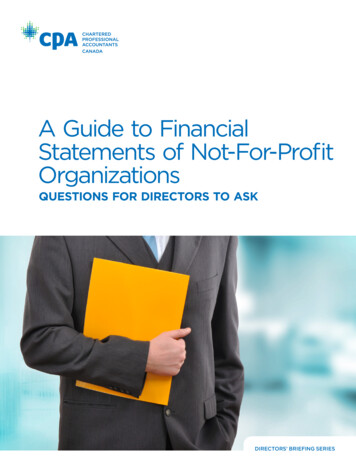
Transcription
A Guide to FinancialStatements of Not-For-ProfitOrganizationsQUESTIONS FOR DIRECTORS TO ASKDIRECTORS’ BRIEFING SERIES
A Guide to FinancialStatements of Not-For-ProfitOrganizationsQUESTIONS FOR DIRECTORS TO ASKThis publication was originally published by The Canadian Institute of Chartered Accountantsin 2012. It has been reissued by Chartered Professional Accountants of Canada.
DISCLAIMERThis publication was prepared by The Canadian Institute of Chartered Accountants (CICA) asnon-authoritative guidance.The CICA and the authors do not accept any responsibility or liability that might occur directlyor indirectly as a consequence of the use, application or reliance on this material.Library and Archives Canada Cataloguing in PublicationA guide to financial statements of not-for-profit organizations : questions for directors to ask.ISBN 978-1-55385-577-41. Financial statements. 2. Nonprofit organizations.I. Canadian Institute of Chartered AccountantsHF5681.B2G83 2012657’.3C2011-902932-4Materials from the Alzheimer Society of Canada and the Canadian Cancer Society were reprintedwith permissionCopyright 2012The Canadian Institute of Chartered Accountants277 Wellington Street WestToronto ON M5V 3H2
A G U I D E TO F I N A N C I A L S TAT E M E N T S O F N OT- F O R - P R O F I T O R G A N I Z AT I O N SPrefaceThe Risk Oversight and Governance Board of the Canadian Institute of Chartered Accountantshas developed this Guide to help directors of not-for-profit organizations (NPOs) to understandthe financial statements of the organization they serve. Although boards may delegate thedetailed aspects of financial oversight to a board committee, all directors have a personalresponsibility for ensuring they understand the financial information provided to them andthe financial implications of their decisions and actions. Directors are expected to probe andquestion until they are satisfied with their organization’s financial information and the directionin which the organization is moving. An understanding of financial statements is a prerequisitefor effective oversight of the financial affairs of the organization.Financial statements in the NPO sector can involve accounting methodologies not found inthe for-profit sector. NPOs are very diverse and range from small all-volunteer groups to largehighly sophisticated enterprises. Some, but not all, have charitable status. This document isdirected to NPOs that are of a sufficient size to require a management team and engage theservices of an external auditor. The sample financial statements in the Guide assume charitablestatus for the organization; however, the Guide is still of considerable value to directors of NPOswithout charitable status.The Guide will assist NPO directors to understand: The role and responsibilities of the board, management and the auditor in financialreporting;The concepts and terminology of financial reporting in the NPO sector;The ways in which contributions (i.e., donations) to the organization can be accounted for;andThe various financial statements they will encounter in their role as an NPO director.Directors of government-sponsored NPOs and NPOs that operate “social enterprises” may findthis guide helpful; however, they face particular financial reporting issues that are not coveredin this briefing.Throughout the Guide, there are sections entitled “Items for directors to watch for and questions to ask”. These sections are intended to assist directors to undertake their governanceoversight role in an effective manner. Directors are encouraged to frame additional questions inthe particular circumstances they face.The Risk Oversight and Governance Board acknowledges and thanks the members of theNot-for-Profit Organizations Committee and the Directors Advisory Group for their invaluableadvice and the CICA staff who provided support to the project. A special thank you is extendedto William G. Wolfson and William Harper for writing this briefing.Huw Thomas, CAChair, Risk Oversight and Governance Boardiii
Q U E S T I O N S F O R D I R EC TO R S TO A S KivRisk Oversight andGovernance BoardNot-for-Profit OrganizationsCommitteeHuw Thomas, CA, ChairAlexandre Guertin, CABryan Held, FCA, ICD.DCatherine Smith, ICD.DDeborah Rosati, FCA, ICD.DDoug Hayhurst, FCA, ICD.DGiles Meikle, FCAJohn E. Walker, FCBV, CA, LL.B.Mike Harris, CA, CIA, ICD.DRichard WilsonSue Payne, FCA, C.DirCatherine Smith, ICD.D., F.I.C.B., ChairAnne PashleyDeryck Williams, FCA, CA ITDiane Sinhuber, FCAGiles Meikle, FCAJulie Thomson, CALarry Murray, FCALarry Whatmore, MBA, CMALyn McDonell, CAE, C.DirMarilyn De Mara, FCASusan Manwaring, LL.B.Directors Advisory GroupCICA StaffGiles Meikle, FCA, ChairHugh Bolton, FCAJohn Caldwell, CAWilliam Dimma, F.ICD, ICD.DGordon Hall, FSA, ICD.DCarol Hansell, LL.B.Thomas C. Peddie, FCAGuylaine Saucier, CM, FCA, F.ICDHap Stephen, CAPeter Stephenson, Ph.D, ICD.DJanet Woodruff, CA, ICD.DGigi DawePrincipal, Risk Oversight and GovernanceRayna Shienfield, J.D.Principal, Risk Oversight and GovernanceGord Beal, CA, M.Ed.Director, Guidance and Support
A G U I D E TO F I N A N C I A L S TAT E M E N T S O F N OT- F O R - P R O F I T O R G A N I Z AT I O N STable of ContentsIntroduction . . . . . . . . . . . . . . . . . . . . . . . . . . . . . . . . . . . . . . . . . . . . . . . . . . . . 1The Process of Financial Reporting . . . . . . . . . . . . . . . . . . . . . . . . . . . . . . . 3The Roles and Responsibilities Associated with Financial Reporting . . 4The Concepts and Terminology of Financial Reporting . . . . . . . . . . . . . . 6Two Key Financial Statements . . . . . . . . . . . . . . . . . . . . . . . . . . . . . . . . . . . 10Items For Directors to Watch For and Questions to Ask . . . . . . . . . . . 14Conclusion . . . . . . . . . . . . . . . . . . . . . . . . . . . . . . . . . . . . . . . . . . . . . . . . . . . . 19Appendix 1 : Other Financial Concepts and Statements . . . . . . . . . . . . 21Appendix 2 : Fund Accounting . . . . . . . . . . . . . . . . . . . . . . . . . . . . . . . . . . 28Appendix 3 : Samples of the Auditor’s Report Addressedto the Board of Directors: Unqualified and Qualified Opinions . . . . . . 35Appendix 4 : Pledges, Bequests, Donations-In-Kind . . . . . . . . . . . . . . . 38Appendix 5 : Glossary of Financial Terms . . . . . . . . . . . . . . . . . . . . . . . . . 40Where to Find More Information . . . . . . . . . . . . . . . . . . . . . . . . . . . . . . . . . 44v
Q U E S T I O N S F O R D I R EC TO R S TO A S KIntroductionThe Importance of the Sector and the Role of Directors in Oversight ofFinancial AffairsIt is estimated that 12.5 million Canadians volunteer with not-for profit organizations (NPOs).Many of these volunteers serve as members of their organization’s board of directors.1 NPOboards are responsible for overseeing the affairs of organizations that constitute about 7percent of Canada’s GDP, generate annual revenues of approximately 80 billion and provide2 million full-time jobs for Canadians. 2 Being a director in the NPO sector is a vitally importantrole.Board members in the NPO sector have a wide variety of skills and interests. Some may feeluncomfortable reviewing financial information and may be poorly equipped to provide therequired oversight of the financial affairs of the organizations which they have been elected togovern. This gap presents a threat to the sustainability of the organization. It may also exposeindividual board members themselves to legal liability. The bottom line is that overseeing thefinancial affairs of NPOs is a key responsibility of the board, and of every member of the board.Directors have a “fiduciary duty” to their not-for-profit organization to act honestly and in goodfaith in the best interests of the organization. This responsibility is sometimes referred to as the“duty of loyalty”, but it is much broader than just loyalty. It speaks to concepts such as the dutyof confidentiality and not participating in decisions in which the director may have a personalinterest. Directors also have a “duty of care” that requires them to act with the care, diligenceand skill that a reasonably prudent person would exercise in comparable circumstances. Thisobligation means that directors must diligently apply their skill, expertise, education and intelligence to the job of being a director to make reasonable business decisions.Directors have fiduciary responsibilities to take steps to ensure that funds are spent in accordance with donors’ or funders’ criteria, that statutory obligations are fulfilled, such as payrolldeductions being remitted to the Canada Revenue Agency, and that internal controls are inplace to avoid the occurrence of fraudulent transactions within the organization. A properunderstanding of the financial statements and information provided to the directors assists thedirectors in fulfilling these responsibilities.A board can delegate the work to prepare financial information, but the board as a whole isultimately responsible for financial reporting. Indeed, one of the fundamental roles of the boardof directors is stewardship of the organization’s resources. This duty includes the responsibilityto protect the organization’s assets and to oversee its financial affairs. Financial statements arethe primary means of communicating information about the organization’s financial position (ata point in time) and financial results of its operations (over a period of time).Though financial information is not the only information required to develop an understanding of the organization, it is a key component. Financial information is typically measurable,objective, comparable over time, sometimes comparable across organizations, and can providean indicator of organizational health. Board members require the ability to understand variousfinancial statements in order to discharge their stewardship responsibility to the organization.Each board member does not need to have financial expertise, or to be a financial expert, butall directors should develop a basic level of financial literacy. This Guide for NPO Directors aimsto provide a practical tool to help board members understand financial concepts and com-121Statistics Canada, Survey of Giving, Volunteering and Participating, 2007Statistics Canada, Satellite Account of Nonprofit Institutions and Volunteering, 2007
A G U I D E TO F I N A N C I A L S TAT E M E N T S O F N OT- F O R - P R O F I T O R G A N I Z AT I O N Sprehend financial statements. Most importantly, this Guide will help directors focus on certainelements in the financial statements and understand how they can use that information tocritically assess and oversee their organization’s financial affairs.Some Common Barriers Impeding Full Board Participation in FinancialOversightWe have an experienced accountant on our board — why should I have to deal withthis?Financial experts such as accountants bring a valuable skill set to the board table, along withtheir field experience and their professional mindset. They are in a strong position to help theirboard peers deepen their understanding of financial matters. Organizations with a financialprofessional on the board are fortunate and should use that person as a resource. Further, thatdirector should expect to play a key role in the oversight of financial affairs, perhaps by becoming a member of the audit or finance committee of the board. (In some NPO organizations,the functions of these two committees are combined into one board committee.) However, asnoted above in the “duty of loyalty”, board members cannot abdicate their responsibility ortransfer it to another board member. Each and every board member must fulfill his/her obligations for the oversight of financial matters to the best of his/her ability.Shouldn’t the board be focusing on our organization’s mission?The ultimate goal of every not-for-profit organization, and hence every organization’s board,is the achievement of its mission. Consequently, a significant portion of the board’s time andenergy needs to be focused on the organization’s mission and progress in achieving it. However,the organization must protect its assets, pay its bills, compensate its employees, receive andmanage donations, and undertake a host of other financial activities. Doing so in an efficientand effective manner is critical to achieving its mission. An organization that is not financiallysecure cannot focus on achieving its mission, as efforts of the board and management aredirected to financial survival.Accounting is just too complex for me!Accounting is indeed a complex subject. There are various financial concepts and accountingprinciples. However, all board members do not need to be accounting experts. Directors shouldstrive to acquire a basic understanding of financial matters, and a basic ability to read, assessand question financial statements and other financial information. Turning to experts for assistance and advice is entirely appropriate, but making final decisions within the context of theorganization’s total financial picture is the responsibility of every member of the board.Isn’t this the job of the auditor3 or of management?The auditor and management both have important and distinct roles to play in ensuring fair andcomplete financial reporting for the organization. So does the board of directors. Managementis responsible for selecting the organization’s accounting policies and preparing, presenting andacting on financial information. The board is responsible for overseeing management and theprocesses for preparing financial information, and for satisfying itself that the
A guide to financial statements of not-for-profit organizations : questions for directors to ask. ISBN 978-1-55385-577-4 1. Financial statements. 2. Nonprofit organizations. I. Canadian Institute of Chartered Accountants HF5681.B2G83 2012 657’.3 C2011-902932-4
